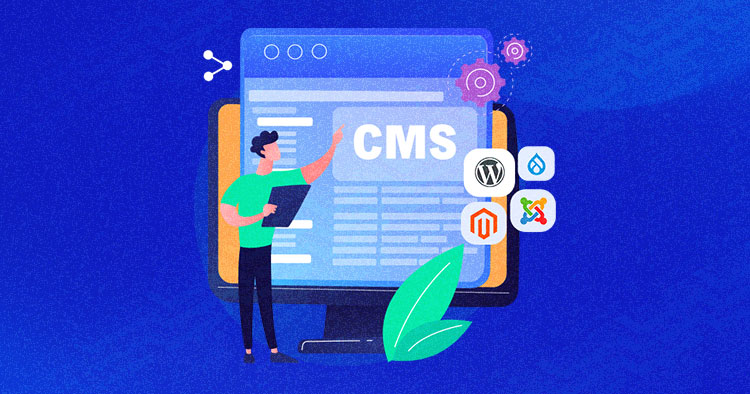
According to built with, more than 64 million websites are deployed on a CMS platform, which lets users create and manage their site and content without any coding knowledge. But with nearly 2000 content management systems, which one’s right for your site?
In this piece, we’ll talk about what content management systems are, and count down the 15 best ones to choose from in 2022.
CMS Hosting Unleashed: Elevating Your Website Management
Experience the Ultimate in Web Management with Managed CMS Hosting on Cloudways!
What is a CMS Platform?
A content management system (CMS) is software that allows users to create, manage, and modify website content without specialized technical skills.
In short, it is a program that allows you to develop a website without writing all of the code from scratch. The tools on CMS platforms allow for versatile websites, and the best ones take care of your security and scalability needs as well.
This article shares everything about the 15 best content management systems. Let’s look at some of the benefits of these platforms before we explore their pros and cons.
The Benefits of CMS Platforms for Small Business
1. Simplicity and Accessibility
Technically challenged individuals can benefit from using these CMS platforms. It is simple to add media and redesign the layout of your website. Some systems can provide virtual training courses that teach beginners how to use complex features.
Most of the best CMS platforms are web-based. So you can edit and update your site from any computer with an internet connection without installing any additional software.
2. Workflow Management
Top CMS platforms allow you to appoint duties to different people or departments within your company. You can set up workflows, approval chains, and permissions.
Workflow in top CMS platforms also lets people view, share, preview, and approve content.
Besides, the best CMS platforms enable you to create rules that ensure content editors fill in all required information to meet standards.
3. Easy to Customize
Plugins and extensions allow you to expand the number of functions available. Also, installing a new theme lets you easily change the overall design and layout.
4. Easy Updates
The best CMS for small businesses allow you to add and remove content quickly. All changes made will be applied automatically. Hence, you do not have to approve every step manually. You’ll also be able to automate website updates.
Many CMS platforms also come with additional security features to protect your data.
5. SEO-friendly
You can look for plugins and tools to help your website rank higher in search engines. These tools are updated regularly to reflect any changes in search engine algorithms.
How to Choose a CMS Platform
To select the CMS platform that’s right for your website, look into the following factors.
- Scalability: The best content management system must be able to scale your website so it adapts to changes as your business grows. Find a CMS that can handle the needs of a growing site.
- Support Team: Customer service team that can help you at any point is critical.
- Customizability: You should be able to customize website design templates based on your requirements.
- Intuitive UI: Find a CMS with a user-friendly interface so you can use it without having technical knowledge.
- Integration with Other Software: For a personalized marketing strategy and insights into users’ web interactions, you need a CMS that can integrate with third-party content management systems.
- Pricing: The basic versions of many CMS are free. You would have to pay for extensions and template designs. Ensure you are working within your budget, and be clear on pricing details.
15 Best CMS Platforms in 2022
Before we start, let’s look at the ratings of the top 15 CMS platforms:
| CMS Platforms | Ease of Use | Ease of Setup | Support Team’s Quality | Minimum Price | G2 Customer Ratings |
|---|---|---|---|---|---|
| WordPress | 8.3 | 8.1 | 7.7 | Free | 8.8 |
| Joomla | 7.5 | 7.8 | 7.3 | Free | 8.0 |
| Drupal | 6.7 | 6.5 | 7.3 | Free | 7.6 |
| Wix | 8.9 | 8.9 | 7.9 | $12.45/mo | 8.4 |
| Concrete5 | 9.0 | 8.6 | 7.5 | Free | 9.0 |
| PyroCMS | 7.5 | 8.5 | 7.7 | Free | 8.0 |
| CMS Made Simple | – | – | – | Free | 9.4 |
| Magento | 7.1 | 6.2 | 7.0 | Free | 7.8 |
| SilverStripe | 8.2 | – | 6.0 | Free | 8.6 |
| Squarespace | 8.8 | 8.8 | 8.5 | $18/mo | 8.8 |
| Sitefinity | 8.0 | 7.1 | 7.4 | $0.01 one-time payment | 7.8 |
| HubSpot CMS Hub | 8.7 | 8.1 | 8.9 | $25/mo | 9.0 |
| TYPO3 | 6.6 | 6.2 | 6.7 | Free | 7.8 |
| Contentful | 8.5 | 8.4 | 8.3 | Free | 8.4 |
| Ghost | 8.3 | 8.1 | 8.5 | $29/mo | 8.4 |
*These values are taken from g2.com
1. WordPress

WordPress.org is our top recommendation for the best CMS platform. Users often seek ideal CMS Hosting that assists them in setting up their website with ideal performance. The most popular CMS software globally, it accounts for 62.3% of the CMS market. Many plugins are available, most of them free.
WordPress has more than 50,000 more app alternatives, some free, some paid-for. These let you design your own custom CMS experience using any number of prebuilt templates.
Pros
- Easy to use without needing a developer to get the website up and running
- Flexibility and freedom to build any type of website
- Supportive community
- Offers much extensibility
- You control how you earn money online from the website you own
- Supports SEO to increase website traffic
Cons
- Website owners need to pay for a domain name and a hosting account with a web host
- WordPress is not responsible for security and backups. But getting Managed WordPress Hosting services from Cloudways can solve these issues for you.
Deploying your WordPress website on Cloud is simple with Cloudways.
Our managed hosting service lets you upload your website on the cloud without any hassles. The process is simple and quick. Plus, you get to enjoy lighting fast speeds and top-level security for your website.
2. Joomla

For those who require custom-type posts, Joomla comes with lots of different templates and extensions. Installing Joomla is not beginner-friendly, but is ideal for developers and experienced website creators.
Pros
- A large pool of extensions that gives plenty of options
- Many design options
- Constant feature updates
Cons
- You may face compatibility issues with a lot of extensions
- Overly complex system
Looking to host your Joomla website on a reliable and high-performing platform?
Cloudways offers optimized hosting solutions for Joomla, ensuring lightning-fast load times and maximum uptime. Sign up now and take advantage of our free trial period.
3. Drupal

Drupal is an open-source CMS software that lets you build a highly customized website that processes a lot of data.
Drupal-based sites have high levels of security and are difficult to hack. It provides free installation and helps with transferring an existing Drupal site. Drupal updates regularly and you should always have the recent update installed for best performance.
Pros
- Great for websites with a large number of pages
- Support is available from the community
- Offer a convenient way of interacting with social networks
- There are many modules that you can use to improve your website
Cons
- Hard to change the appearance of your website
- Expensive customized themes
- Your ecommerce store can only accept payments via Paypal or Authorize.net
4. Wix

Wix is a user-friendly platform with a free plan available.
Its customizable drag-and-drop builder makes it easy to create pages that suit your taste.
Pros
- Automatically optimize all mobile sites
- Automatically installs all security updates
- Many pre-made templates
Cons
- Unable to change templates once chosen
- Difficult to download and export data
5. Concrete5

This free-of-charge platform is an open-source CMS software that can adapt to your company’s demands. It’s great for small businesses.
You can even use Concrete5 to create a social network, a blog, or a forum for people who share common interests.
Pros
- Allow many users to collaborate on your website
- Beginner-friendly
- You can share documents safely
Cons
- No autosave feature
- A poor file sorting system
6. PyroCMS

PyroCMS offers many different options for creating content, from large, global websites to small niche enterprises, without requiring much coding knowledge.
It does not include any potentially dangerous plugins.
Pros
- Compatible with smartphones, so you can manage your websites anywhere you want
- You have more control over the content and style of your website
- You may easily create apps and then translate them into another language
- The dashboard is clean and well-designed, making programming easier and accessible
Cons
- Lack of documentation
- Does not scale well with complicated enterprise applications
7. CMS Made Simple

It is an open-source CMS software that can create and maintain websites and web applications.
Editors will find it simple to use, while developers will find it effective in creating highly customized web pages and applications.
Pros
- User-friendly CMS
- Best CMS for small business
- Fully customizable templates
Cons
- Many outdated modules
- No native support for multilingual sites
8. Magento

Magento is a robust open-source CMS platform from Adobe, the world’s largest software firm. It has many promotional and marketing tools available, like coupons.
A free version of Magento is available for users to download. It includes powerful features to help you begin, run, and develop your business professionally.
Pros
- There are many third-party extensions for additional functions
- You can find and select products based on category
- Provides many payment methods such as credit cards
Cons
- Overwhelming features for beginners
- Expensive to hire developers
- Very expensive, costing around $22,000/year
- Magento doesn’t work without dedicated hosting services. You’ll need to get a fast magento hosting service for your store.
Magento 2 Hosting: Better, Superior, and Ready-for-Use
9. SilverStripe

Silverstripe provides highly customized coding solutions, and is cost-effective in handling both large and small websites. You can quickly produce websites with different designs.
Pros
- Easy to customize your site with different tools
- Search Engine Optimization (SEO) support makes it easy to attract people to your website
- Free to use and open-sourced
Cons
- Not beginner-friendly
- It’s challenging to find solutions to unusual problems that are not in the tutorials
10. Squarespace

This software has a polished appearance. You can find many themes and templates available categorized by industry.
Squarespace creates a beautiful website without the need for coding or a complicated backend. It is one of the best CMS for small businesses.
Pros
- You can edit templates using drag-and-drop technology
- It integrates with Getty Images to make sourcing images easier
Cons
- You would have to upgrade your plan to sell products that start at $40/per month
- No phone support
- No support for third-party apps
11. Sitefinity

The platform is helpful for businesses of all categories and sizes. It allows these companies to engage with and retain clients.
Sitefinity can optimize multichannel experiences and is ideal in a fast-paced marketing environment.
Pros
- Drag-and-drop editing allows marketers to produce and manage great content more quickly
- Provides information to improve the consumer journey
- 360-degree customer view
Cons
- Terrible customer service
- Not intuitive
- Pages are sometimes unintentionally locked
12. HubSpot CMS Hub

HubSpot CMS Hub is an excellent choice for all businesses searching for an all-in-one website management system.
It has a comprehensive library of resources, specialized account managers, and a support system.
Pros
- Integrates easily with their email marketing tool and sales CRM
- Content features to target specific visitors to your website page
- Has built-in security features
Cons
- High cost
- Only has a free trial, yet no free version
13. TYPO3

It has open-source scripts which advanced programmers use to find various functionalities.
TYPO3 can handle websites in several languages as it grants users a wide range of permissions. You can assign users to editor groups.
Pros
- You can easily change the permissions of individuals who work on your site
- You can customize TYPO3 in any way you desire
Cons
- Not easy to install and set up
- Lack of themes
14. Contentful

It helps thousands of brands worldwide manage digital experiences for their customers across many channels by enabling better speed and scale than other top CMS platforms.
You may use Contentful’s APIs to bring your content everywhere. It also allows you to modify your content structure and use your favorite programming languages and frameworks.
Pros
- Easy API integration
- Friendly configuration
- Clear data structure
- Loads faster than other CMS for small business
Cons
- Time-consuming to create new pages
- The number of content kinds that you can display on a single page is limited
15. Ghost

It is a blogging-focused content management system that does not require users to deliver their material in a specific format.
You can run an online magazine or publication that requires payment via Ghost efficiently.
Pros
- Built-in Search Engine Optimization (SEO) support
- Easy to create different themes
- Minimal blogging platform
Cons
- Do not offer much flexibility
- Requires a domain name and web hosting
- Not supported by many web hosts
Why Choose a CMS Software?
Top CMS platforms allow you to appoint duties to different people or departments within your company. You can set up workflows, approval chains, and permissions to ease your tasks.
Besides, workflow in top CMS platforms allows people to view, share, and approve content. It lets you preview content before posting to ensure quality.
In addition, these best CMS platforms, including ExpressionEngine, enable you to create rules that ensure content editors fill in all required information to meet standards. ExpressionEngine’s robust content management features provide an extra layer of control and customization, making it easier to maintain content quality and consistency.
You can also edit and update your site from any computer with an internet connection. You do not need to install any additional software since these platforms are web-based.
Not only that, many CMS platforms also come with additional security features to protect your data. Hence, you can use them with a better sense of security. We’ve also personally tested each CMS platform to ensure it helps your online wholesale business.
Managed CMS Hosting on Cloudways: Unleash the Full Potential of Your Website!
Unravel the Magic of Craft CMS Hosting on Cloudways: Fast, Secure, and Supported!
What’s Next
Now that you have understood all you need to know regarding top CMS platforms, it is time to select one.
With the help of CMS platforms, you can get your company website up and running in no time. Talk to us if you need more information about sourcing for your ecommerce business.
Disclaimer: This post was published in collaboration with Sharline, the founder of Leeline Sourcing. With 10 years of experience in the field of sourcing in China, we help 2000+ clients import from Alibaba and 1688 to Amazon FBA or Shopify. If you have any questions about sourcing, please feel free to contact us.
Sajjad Shahid
Sajjad is an Ecommerce Community Manager at Cloudways. He loves helping out Ecommerce store owners, merchants and marketers in establishing their businesses and startups. Sajjad enjoys playing table tennis and cricket over the weekend.

